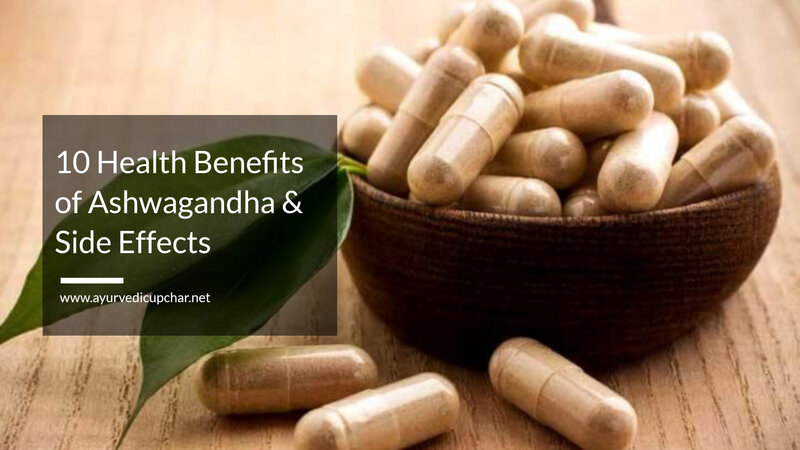10 Health Benefits of Ashwagandha & Side Effects
 Ashwagandha, also known as Withania somnífera, is a typical medicinal plant from India and widely known for its health benefits, its antioxidant properties support the immune and nervous systems and can even be used as an aphrodisiac.
Ashwagandha, also known as Withania somnífera, is a typical medicinal plant from India and widely known for its health benefits, its antioxidant properties support the immune and nervous systems and can even be used as an aphrodisiac.
Ashwagandha health benefits
1. Anxiety or depression: This herb, popularly called ” Indian Ginseng “, is used as an effective treatment against insomnia, since it acts as a muscle relaxant and allows you to fall asleep soundly. It also reduces the symptoms of stress and its effects are comparable to medications used to treat anxiety or depression.
2. Alzheimer’s or Parkinson’s: Various medical studies have proven that Ashwagandha, thanks to its high levels of antioxidants, has a positive effect on people suffering from serious degenerative diseases such as Alzheimer’s or Parkinson’s disease since it benefits the synapse, that is, the reconstruction of the neuronal cell union, regenerating the central nervous system.
3. Rheumatoid arthritis: The plant also works as a powerful anti-inflammatory and is used to treat pain related to osteoporosis and rheumatoid arthritis, in those cases it is applied as an oil in the affected areas causing almost immediate relief.
4. Type 2 diabetes: It is also consumed by patients with type 2 diabetes, as it helps regulate blood glucose levels, it is also a suppressant of sweet cravings and reduces appetite, which is why it is recommended for newly diagnosed people who are adapting to the new diet.
5. Anti-cancer effects: According to scientific research from the University of Arizona, Ashwagandha has anti-cancer effects and has been shown to prevent the reproduction of tumor cells in patients with breast, lung, and colon cancer, since withaferin, one of the components of the plant, inhibits the growth of blood vessels in malignant tumors, preventing it from increasing in size.
6. libido or infertility: The properties of this herb revitalize the body and that is why it is traditionally used in Asia as an enhancer of male libido, among its effects, is the improvement of blood circulation and is used in cases of sexual impotence or even infertility.
Aesthetic uses of Ashwagandha
Ashwagandha, in addition to all the benefits it brings to health, is also used as a natural aesthetic treatment, which rejuvenates the skin and strengthens the body, increasing the vitality and energy of those who consume it.
Thanks to the antioxidants found in its components, the plant manages to combat free radicals, which are the body’s chemicals responsible for aging, wrinkles, and skin blemishes. Consumption of Withania somnífera reduces the effect of these molecules, delaying the visible signs of aging.
Its benefits do not end there as it also stimulates the production of collagen, which keeps the skin fresh and smooth. Its leaves also have healing properties and that is why it is recommended to be applied to wounds, as it is useful in the skin healing process.
High levels of cortisol, a hormone produced by stress, affect the body and cause hair loss since Ashwagandha stabilizes the amount of cortisol and stimulates hair follicles, it works as a treatment against hair loss, as well as revitalizing it. because it promotes the production of melanin which maintains its pigmentation.
The plant is also rich in vitamins and minerals such as iron, potassium nitrate, fatty acids, and glucose, which is why it improves digestion and eliminates toxins that are ingested through food.
Ashwagandha consumption.
There are different ways to consume Ashwagandha, from capsules found in pharmacies to natural infusions made at home.
Withania somnífera can be found in capsule form in most pharmacies, and many relaxing medicines or sleeping pills are made from this plant.
It is easily accessible and you can take a daily pill, however, the effects will begin to be noticed after a couple of weeks of starting your intake.
The most typical way to consume the herb is through homemade infusions, for this, you must buy the root of the plant in any health food store and proceed to boil for about 15 minutes.
Ashwagandha is known for its powerful flavor and odor, sometimes described as “horse scent”, so it is recommended to combine it with other natural herbs such as thyme, licorice, or eucalyptus.
You can also get the extract of the plant in powder to add to drinks, preferably juices, and thus disguise its bitter taste.
Ashwagandha side effects.
- As a natural plant, Ashwagandha does not usually have any adverse side effects, however, its consumption in large quantities can, like everything else, produce negative symptoms.
- Due to its diuretic properties, excessive consumption of the plant can cause severe abdominal pain and even diarrhea.
- Its consumption is not recommended for people with HIV or taking immunosuppressants, as its stimulating effects on the immune system can be harmful.
- It should also not be used by pregnant or breastfeeding women, as it can interfere with the baby’s nutrition.
- Since the plant has sleeping pills, special care should be taken if it is ingested while the person is using medications for anxiety, depression, sedatives, or any barbiturate, since its effect can be potentiated by these substances.
- Furthermore, it is recommended that once the Withania somnífera is consumed, the individual avoids the use of heavy machinery, as it will be more difficult to maintain concentration and speed of reflexes.
Without a doubt, Ashwagandha brings great benefits to the human body, various medical studies are currently being carried out on this ancient plant, since it is believed that its components could be the answer to various degenerative diseases.
Consuming this herb will lead us to enhance our vitality and increase our quality of life, used for many centuries in the eastern world, today we have the opportunity to use it in the West, either with doses recommended by the doctor or as a tea of Herbs, Withania somnifera should be included in your routine.
Note: Consult with your specialist doctor before incorporating any significant product or change into your diet.























